By David Wandabi – Programs Officer – Education for Sustainable Development (ESD) & Eco-schools Coordinator, KOEE
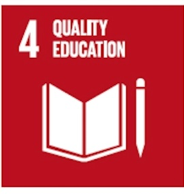
Quality Education
The Eco-Schools methodology is a powerful tool for providing quality education for sustainable development at all school levels. Its whole institutional approach (WIA) ensures an inclusive implementation throughout the whole kindergarten, school or campus, and the involvement of all children and students.
Eco-schools Kenya employ a whole institutional approach that uses schools as entry points to reach communities through pupils, teachers, parents, non-teaching staff, all departments and other stakeholders of the school to address local challenges of sustainable development. WIA requires not only the reorientation of teaching content and methodology, but also school and facility management that is in line with sustainable development as well as the cooperation of the institution with sustainable development stakeholders in the community (UNESCO, 2016). Eco-schools strategy acknowledges that all departments in a school need to synergize for sustainable development action.
Some of the benefits of the WIA include: efficient use of resources hence the institution saves money, greening of school grounds, creating extra source of income from the micro-projects, creation of environmental awareness, development of desirable skills and attitudes for sustainable development, development of a sense of belonging in the school and ownership of sustainability initiatives, enabling acquisition of new professional learning opportunities by the teachers, providing opportunity to have hands on learning opportunity using sustainable development micro-projects, contribution to solving local development challenges by the school and community and thus reducing their ecological footprints significantly and strengthening relationships with families and local community (UNESCO, 2016).
Whole Institutional Approach Case Study
An Eco-school that best demonstrates the whole institutional approach is Watema Primary School. The school is located in Kaiti Sub-county in Makueni County of Kenya. It has a student population of 463 (239 boys and 213 girls) with 15 teachers.
School governance
The school has an inclusive Eco-committee including the head teacher, Eco-schools coordinator, representatives from school board of management, parents and pupil representative from all classes. Additionally, the school has also co-opted a civil society representative in the committee. Being in arid area, the committee is proactive in guiding the school on how to get the best out of their environment to make learning as enjoyable as possible.
Facilities and Operations
The school has strived in making itself a model of sustainability in the area, embracing a number of green initiatives to promote self-reliance in the community in order to eradicate poverty in the area. The school has two solar panels to supplement electricity to cut energy costs. The school has four roof water harvesting tanks with a capacity of 10,000 litres each to supplement their water which they get from a dam outside the school. With the area having erratic rainfall patterns, the water harvesting system ensures the school has water for drinking, cooking, washing hands and watering plants for over two months. The water has enabled the school grow vegetables, sweet potatoes and fruit trees for food and income generation. The school also grows fodder to make hay for sale. The school has a nursery for indigenous trees to provide seedlings for sale. The harvested water has also been used to construct hand wash facilities near the toilets to enhance sanitation and hygiene.
The main outcomes of the green initiatives are:
- The pupils have been able to learn practical skills in the conservation of the environment.
- The pupils have been taught ways of being self-reliant through starting green enterprise for income generation.
- The community has been enlightened on the importance of green entrepreneurship for sustainable development.
Teaching and Learning
The Eco-school initiatives have enhanced teaching of sustainable development issues in all subject areas in the school as teachers use the projects as teaching and learning resources. Students are provided with an opportunity to learn issues like enterprise development, water harvesting, tree nursery development, irrigation among others which offers them a platform to create green jobs. This has helped in propagating the teaching of critical, creative and futures thinking as students are challenged to be innovative in finding practical solutions to their local challenges. In this way, the pupils are contributing to solving local development challenges and thus reducing their ecological footprints.
Community Partnerships
The school is working with community members in implementing the projects for learning and teaching. Community members and groups visit the school to buy vegetables, tree seedlings and fodder and the school has also influenced other schools around them to embrace environmental conservation. Additionally, the school is working closely with the County Government of Makueni which donated two water harvesting tanks to the school to support the Eco-school initiative. The school uses local experts from the community to teach the students on various farming technologies.
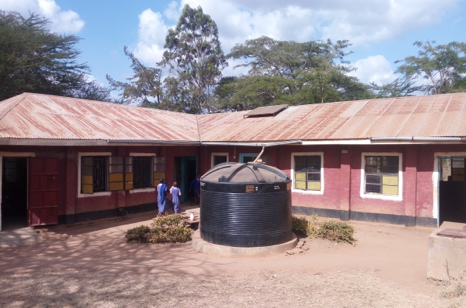
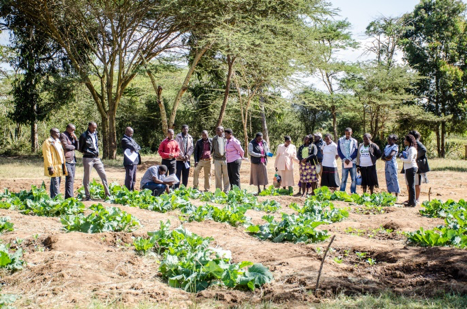
Roof water harvesting system, solar and vegetable gardening projects implemented in partnership with the community at Watema Primary School
References
UNESCO (2016). Getting Climate Ready: A Guide for Schools on Climate Action. UNESCO.Paris.

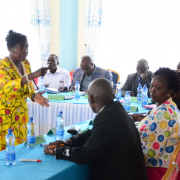
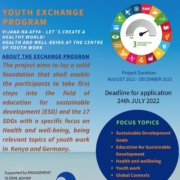
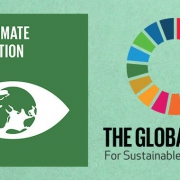
There is noticeably a bundle to find out about this. I assume you made sure nice points in features also. Magdalen Calvin Cattier